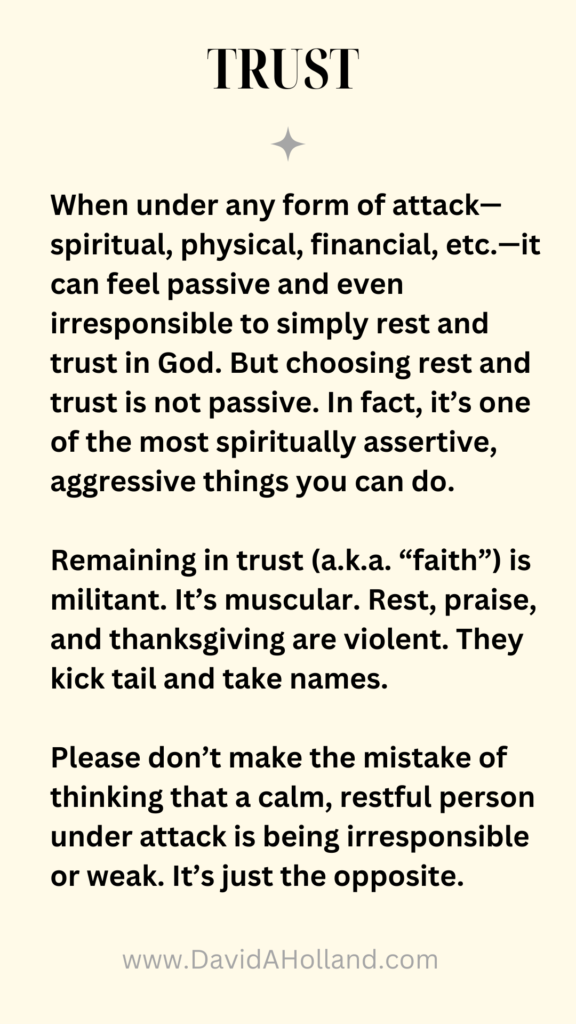
You are no doubt familiar with Jesus’ parable of the Prodigal Son. Maybe too familiar. Sometimes we let familiarity keep us from seeing things we’ve never seen before.
It really should be titled “The Parable of the Merciful, Gracious, Generous Father.” As I pointed out in my devotional, Praying Grace, neither of the two sons in Jesus’ story had a clue about the nature of their relationship and standing with their father. And the same thing is true of most believers.
Religion has robbed us of clarity and understanding of what it really means to be a child of God. The traditions of men have warped our view of who we are, and what we have and, most of all, who the Father truly is.
But for now I just want to pose a thought experiment concerning the brother who took his portion of the inheritance, walked away from his father, rejected every moral value his father held, and proceeded to blow through a big chunk of what his father had worked a lifetime to accumulate–and did so in the most defiling, self-destructive way possible. And he returned home only when on the verge of starvation and living in the most degrading, dehumanizing conditions imaginable.
Here’s what I want you to ask yourself . . .
Why did the young man in Jesus story wait so long to return home?
Why not go home when the money ran out? Or head back when he lost his place to live. Or at any other point in his downward spiral in life? If you put yourself in his place, you know the answer to that question. Two things kept him from the welcoming arms of his gracious father.
Pride and Shame
Pride said, “You can’t go back there with your tail between your legs. You’ll look like the fool you actually are.” Shame said, “You were an arrogant idiot. You were a bad son. You’ve done terrible things. You essentially rejected and spit on everything your father stands for and exemplifies.”
So . . . Only when desperation got bigger than pride and shame, did he head homeward. Only when he was willing to admit that he was utterly powerless to address his own basic needs did he make the choice to seek the face of father again.
Here is why I mention this here: The same two obstacles stand betwen most believers and the arms of their Father on most days. When they get in a pickle, they are reluctant or sheepish about seeking the face of their father. And for the same two reasons: Some combination of Pride and Shame.
Pride tells us we need earn our help. That we need to have exhuasted all personal, natural avenues and resources to fix it ourselves before we throw ourselves into the arms of our heavenly Father. Or until we done some penance or self-punishment. Pride tells us we mustn’t admit that we’re utterly powerless and completely helpless.
And Shame convinces us that we won’t be welcome if we run to God. That we’ve done too many “don’ts” and not done enough “dos” to qualify for help. That if we we run to Him, it’s not a smile of delight and open arms we’ll find there, but rather a frown and a punishment stick.
By the way, Pride and Shame often masquearade as authentic “Fear of the Lord.” But that’s a topic for another post.
The promise of Hebrews 4:16 which plainly states that, because of Jesus, we can “come BOLDLY to the throne of grace to obtain mercy and receive help in time of need,” seems like an unattainable benefit that “better Christians” than we have somehow earned or qualified for.
Of course, Pride led to the fall of humanity. And Shame was the first effect. And the then Pride moved our ancestors to create religion and religious activity (fig leaves) to deal with the shame.
But for the blood-bought Christian, Jesus’ parable exposes both Pride and Shame as liars.
One of the truths that make the Gospel “good news” is that Jesus bore our shame on the cross. (Hebrews 12:2) In fact, a key part of the sounds-too-good-to-be-true miracle of the new birth is that we receive “the gift of righteousness.” (Romans 5:17) In fact, we are wrapped in Jesus Himself and His righteousness. (Galatians 3:27) We actuallly “become” the righteousness of God. (2 Corinthians 5:21)
Deeply renewing your mind to that truth chokes out shame at the root. (But so few have actually done this.)
So the only remaining obstacle to deep connection and joy and power in the arms of the Father remains pride–the original sin. The sin that got Lucifer cast out of heaven. The sin that knocked over the first domino of The Fall at the wrong tree. The sin that drives, even believers, to try to contribute something to their salvation. Or pay back, or earn, or merit, or qualify.
Here, too, the neglected truth of the New Covenant has an answer. “Apart from me you can do nothing,” Jesus told us. What part of “nothing” do we not understand? Paul, in 2 Corinthians 12:9, passes along a word he heard directly from Jesus when he was struggling with something. Faithfully paraphrasing, “Rest. Relax. Chill. My grace is sufficient for you because my power emerges and takes over whenever and wherever you recognize that you’re weak.”
So, dear Christian, if you’re struggling or hurting and flailing in any in any area of your life, here’s my question for you today:
“What are you waiting for?”
Why not run to His arms now? It’s possible you’re letting Pride or Shame or some combination of both unneccearily keep you from the very place where you’ll find everything you need.
As I said in the devotional Praying Grace, in the entry titled “Our Rejection for His Acceptance”:
Fly to Him, child of God. Run as fast as your feet can carry you. Know that you are accepted, loved, and unspeakably welcome. Then with grateful mindfulness of all He has done for you in the past, pour out to Him your requests.
Note: If shame is your primary obstacle, please allow me to urge to you get this book by my friend Alan Wright–a pastor and brilliant writer: Shame Off You.



